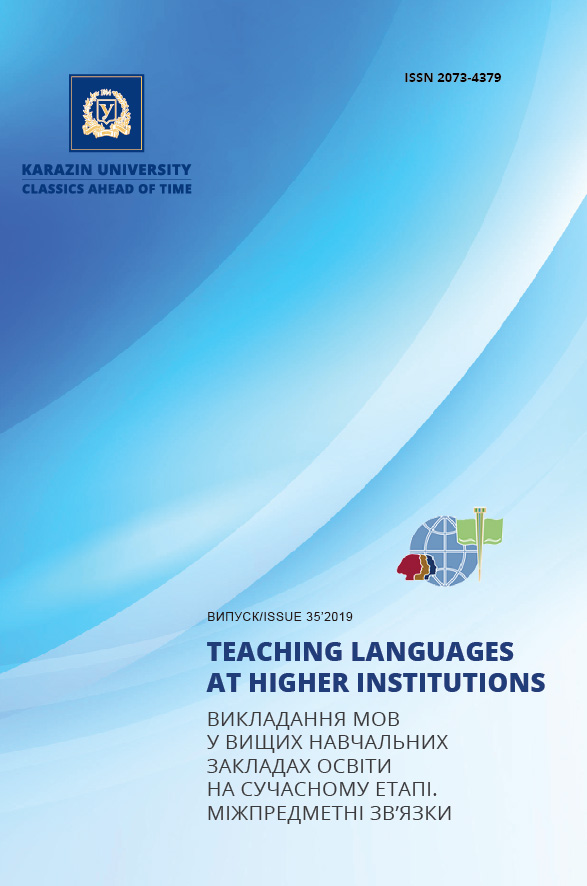Features of the adaptationof educational migrants in the bilingual environment
Abstract
The authors of the article examine the most significant issues that are related to the peculiarities of the manifestation of interference in the closely related languages – Russian and Ukrainian. Despite the fact that official Ukrainian Studies usually consider Ukraine a single-level and monolingual state, it must be admitted that the Ukrainian-Russian bilingualism is a system-forming feature of the linguistic situation in most Ukrainian regions. The authors describe and analyze the types of difficulties that are caused by the peculiarities of interlingual interference of closely related languages, and give linguistic and methodical recommendations for overcoming such issues. Interlingual interference covers all language levels and is especially pronounced at the phonetic level since there are significant differences in the systems of vocalism and consonantism. At the phonetic level, interference appears at the early stage of developing listening and pronunciation skills. At the grammatical level, there are differences between similar Russian and Ukrainian nouns in their gender and number. Another difficulty lies in the fact that some lexical units in these two languages sound the same but have different meanings. The inability to distinguish such words causes multiple errors. Differences in the characteristics of closely related linguistic systems are also observed in speech etiquette, which is especially important when teaching a language to educational migrants. One of the possible props for overcoming interference is an active learner’s vocabulary, which should become an assistant in mastering a language. The authors hope that the recommendations outlined in the article will help to overcome the arising difficulties and make the process of teaching foreign students a second non-native language easier and more successful.
Downloads
References
Haiovych, H. Interferentsiia i surzhyk yak naslidky movnoi vzaiemodii (na prykladi ukrainsko-rosiiskykh movnykh kontaktiv) [Interference and surzhik as consequences of linguistic interaction (on the example of Ukrainian-Russian linguistic contacts)]. Available at: http://www.philology.kiev.ua/library/zagal/Movni_i_konceptualni_2012_41_1/224_233.pdf [Accessed 16 Feb. 2019] [in Ukrainian].
Metodyka vykladannia ukrainskoi movy [Methods of teaching the Ukrainian language]. Available at: https://studfiles.net/preview/5537864/page:13/ [Accessed 9 Jun. 2019] [in Ukrainian].
Minasyan, S.M. (2017). Problemy adaptatsii obrazovatelnyih migrantov v akademicheskoy srede [Problems of adaptation of educational migrants in the academic environment]. Ushakova, N.I. (Ed.). Akademicheskaya adaptatsiya obrazovatelnyih migrantov v strane obucheniya [Academic adaptation of educational migrants in the country of study]. Kharkіv: V.N. Karazin Kharkiv National University, рр. 39–45 [in Russian].
Muras, A. (2007). Vykladannia ukrainskoi movy yak inozemnoi v universyteti imeni Adama Mitskevycha v Poznani [Teaching Ukrainian as a Foreign Language at the Adam Mickiewicz University in Poznan]. Teoriia i praktyka vykladannia ukrainskoi movy yak inozemnoi [Theory and practice of teaching Ukrainian as a foreign language], 2, рр. 258–261 [in Ukrainian].
Passov, E.I. (2007). Kontseptsiya kommunikativnogo inoyazyichnogo obrazovaniya (teoriya i ee realizatsiya) [The concept of communicative foreign language education (theory and its implementation)]. St. Petersburg: Zlatousts [in Russian].
Psiholingvicheskie voprosy obuchenija inostrancev russkomu jazyku [Psycholinguistic issues of teaching foreigners the Russian language]. (1972). Moscow: MGU [in Russian].
Shcherba, L.V. (1974). Predislovie k bol'shomu russko-francuzskomu slovaryu: Yazykovaya sistema i rechevaya deyatel'nost' [Foreword to the large Russian-French dictionary: The language system and speech activity]. Russko-franczuzskij slovar' [Russian-French dictionary]. Moscow: Nauka, рр. 17‒23 [in Russian].
Shpitko, I.M. (2010). Fonetychna interferentsiia v informatsiinomu prostori Ukrainy [Phonetic interference in the information space of Ukraine]. Doslidzhennia z leksykolohii i hramatyky ukrainskoi movy [Studies in lexicology and grammar of the Ukrainian language]. 9, рр. 323–331 [in Russian].
Shubin, Je.P. (1971). Pozitivnye i negativnye aspekty vlijanija pervogo jazyka na ovladenie vtorym na razlichnyh urovnjah jazykovoj sistemy [Positive and negative aspects of the influence of the first language on mastering the second at various levels of the language system]. Inostrannye jazyki v shkole [Foreign languages at school], 5, рр. 27–32 [in Russian].
Ushakova, N.I. (Ed.). (2017). Akademicheskaja adaptacija obrazovatelnyh migrantov v strane obuchenija [Academic adaptation of educational migrants in the country of study]. Kharkіv: V.N. Karazin Kharkiv National University [in Russian].

